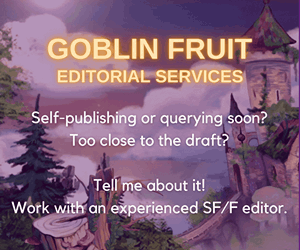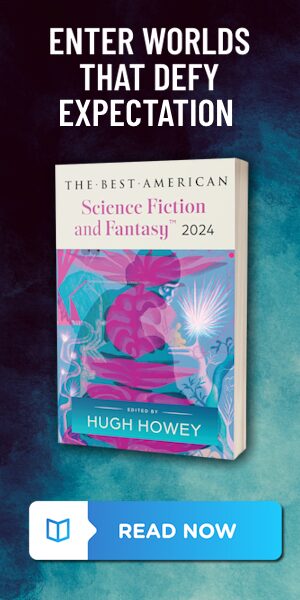“Water Rights” begins with an immediate, visceral image that marks the story as terrifyingly near future science fiction. What was the inspiration behind this tale?
Back in 2011, Jonathan Strahan invited me to contribute to an anthology of “science fiction set in a settled, industrialized, pre-starflight solar system,” and my immediate response was more or less, “I want to go to there!” I never really thought of myself as someone who wrote hard SF (and the invitation specified “original hard SF/action adventure”), but I always kinda wanted to be, so this was a great excuse to stretch those wings.
I can’t remember exactly what I was thinking about in mid-late 2011, but it was probably some combination of hydroponics as a high-efficiency food source (This is awesome: bit.ly/organichydro!), water management (complicated, and often a hilariously tragic comedy of reckless hubris even here on Earth today), and space being vast and impartial (aaaaaa).
I thought that starting off with a bang would help meet the “action adventure” quota of the prompt, with the added bonus of being able to play with depicting explosions in a place where characters wouldn’t be able to hear the sound or feel the blast. Of course, the characters promptly decided that this was enough action and adventure for the time being and spent the rest of the story talking about things, but I got to write cool space explosions, so I regret nothing.
Your work often explores the division of culture and identity. Here we see conflicted cultures, economic states, and political views, all bound together by the very real struggle for a necessary element of life. Do you find it challenging to weave such intricate conflicts in the same story?
I think it definitely contributes to my inability to write short things, heh.
As for challenge . . . I don’t know that it’s any more of a challenge than figuring out how to structure a satisfying plot. Actually, scratch that: Getting a plot and arc together causes me a lot more headaches, wailing, lamentation, gnashing of teeth, etc. Plots are hard.
I always want to have complexity in people and their particular situations and viewpoints, and I always want to write more into a story and do it better, because I think that’s the natural state of a lot of people around me. We’re all moving through a life with strange bedfellows and all manner of different cultural and individual assumptions and finding out how we fit or if we fit with other people. And that’s not even touching on how we figure out where we fit in the world.
Thinking out complex identities and idiosyncratic conflicts often comes up in the first stages of working out what X or Y plot element is going to mean within the fic—what it might mean to different people here and now. And then, by writing it into the story, I can inflict my existential unease on all of you in the name of dramatic tension. Ha-hah.
You make excellent use of both representation of realistic scientific detail and skilled female characters in the story. What are your thoughts on the representation of women in the sciences in science fiction? As a genre, do you feel science fiction has reached the pinnacle of representation, or do we still have far to go?
I’m going to answer the second question first. And I’m going to answer the question by saying that I don’t think the pinnacle of representation actually exists.
When we tell stories, we’ve got the diverse life experiences of seven-plus billion living people to contend with, as well as the life experiences of every person who’s ever walked the Earth, and every person who ever will—not to mention those people whose existences are not (or were not) impossible, but who don’t end up in existence through whatever vagaries of fate/chance/determinism. Into that, any author is shining a very narrow beam of insight, bounded on all sides by the things we haven’t learned about and can’t extrapolate, and by things we’ve learned to discount as simply not a possibility.
No matter what we do, we’re never going to match the diversity of actual human existence. A “pinnacle of representation” is a construct like an infinity or an asymptote. We’re not going to get there. But it provides us a direction in which we can head, if we think it’s worthwhile.
Personally, I do think it’s worthwhile. I think that finding ourselves and our aspirations reflected back to us in a wide variety of media is important and empowering—to steal a phrase from Mary Oliver (phys.unm.edu/~tw/fas/yits/archive/oliver_wildgeese.htm), it’s “over and over announcing your place in the family of things.” And for those of us who aren’t necessarily reflected in those images, seeing them helps to broaden that beam of insight through which we view the world around us. We learn to regard possible things as possible.
(I think that’s one of the reasons that network reality TV shows and YouTube science channels both enjoy immense popularity: Regardless of rigor, they let us enter into places and experiences that are outside of what we can experience on our own. I may not know what it’s like to be a farmer on a cranberry bog, or even that cranberries grow in bogs, but Dirty Jobs can show me; I may not have the faintest idea what goes on in a professional kitchen, but Top Chef will show me; I may not ever get to go—or ever want to go—to the basement of the Pripyat hospital or the Fukushima exclusion zone, but Veritasium will take me there. Judging from viewing figures, people are hungry for those experiences.)
. . . It’s worth noting that the female scientists in Water Rights aren’t particularly groundbreaking, when it comes to diversity. Which doesn’t mean there can’t always be more female scientists in fiction! Instead of looking at how many times something has been done, I think it’s more useful to look at the larger stories we’re telling, not as individuals, but as participants in a much vaster body of stories in the culture around us. When you’ve got a large body of stories that seems to say, “X is always the case” or “Y is never the case,” then we’ve written ourselves into a place of ignorance. That isn’t a moral judgment; ignorance is a natural state, and one we’re born into, because when we’re born, we just don’t know anything. But ignorance isn’t useful. And when enough people are living in and acting from a place of ignorance, that can work in opposition to attempts to make an interconnected and socially resilient society. So shining those beams of insight into places of ignorance is generally a good idea.
In fiction—through ignorance, accident, or political bias—we may start seeing patterns like “no women are scientists” or “all heroic people are beautiful” or “all interesting stories are told about people before their old age” or “no future for humanity is hopeful.” And when we see those patterns, well, maybe it’s time to start injecting counter-narratives. It doesn’t mean to excise those themes from our stories entirely, but it does mean some attempt to build up a canon of works with other takes on the issue.
So that’s what I wanted to do in “Water Rights.”
I know I still have far to go. And the genre also still has far to go, and the genre will continue to have far to go as our range of insight widens and we become more aware of our areas of ignorance. But so long as that beam of insight is widening, I’m okay with not making it to a pinnacle anytime soon.
If you had the chance to live in near-Earth orbit, what would you like to do to earn a living?
Oh, wow.
You know, I think I’d rather visit near-Earth orbit than live there. I like Earth things, like long walks, cats, bone density, and an atmosphere which shields me from solar radiation. If someone wants to create a near-Earth orbit resort and organize an affordable writer’s retreat up there, I will leap at the chance, but I think my permanent residence should probably remain planetside.
If I was living up there, I hope I’d be doing something cool, though. Science education, maybe; I could go around and interview all the scientists and blog or vlog about it for audiences back on Earth. Not only would I be helping expand the public perception of the possible, but I’d also get to learn all about the science going on, first-hand! Plus, I wouldn’t have to deal with all the parts that weren’t exciting (see xkcd.com/683). I could just give the top-level overview and all the enticing bits.
Alternately, I’d like to do something with computers and programming. Or maybe I could be the short story laureate. That’s a job, right?
What does science fiction mean to An Owomoyela?
My very favorite definition is and remains a section from the Asimov’s Science Fiction manuscript guidelines: “A good overview would be to consider that all fiction is written to examine or illuminate some aspect of human existence, but that in science fiction the backdrop you work against is the size of the Universe.”
Science fiction is fiction whose world or events are freed from the constraints of what we currently believe to be possible or real; it’s also fiction which, when it needs to justify those breaks from our understood reality, points to some natural process or process of reason instead of something numinous or fundamentally unknowable. Science fiction fits itself into (or plays with, or pays lip service to) the frameworks of science in the fabric of the story itself.
Freeing ourselves from the constraints of what we assume to be possible or real is why science fiction and fantasy have always been fun, to me. What if is more fun than what is.
You work spans a number of genres and styles. How do you continue to challenge yourself? How do you push your own envelope as a writer?
I indulge my magpie-mind. I have real trouble throwing any ideas away, even the ones that are manifestly unworkable, which means I always have a lot of material I can use to examine how things work and how I can make them work. I also like proving to myself that I can do things which I have no idea how to do—for example, I’ve tried a couple times to write some kind of bizarro story (as I have a couple friends who work in that genre), and while I can’t say I’ve succeeded, I have learned a lot from the process of failing.
I also look for ways to keep things fun. I’ll host prompt calls once in a while, where people can throw ideas at me and I’ll get to see how I’d turn them into stories or scenes. Or I’ll play around with various forms: At one point I took a list of dramatic terms (bit.ly/dramatic_terms), selected and ordered twenty-five at random, and paired each of those with a wordcount—a multiple of fifty, from fifty to 500, each of those also randomly chosen. Then I tried to write a cohesive story where each scene played with its assigned term in exactly the wordcount allotted. (Structurally, it’s hilarious. The denouement is the fourth scene in, and I was given fifty words for it. The rising action, on the other hand, is the seventh scene from the end. I got 400 words for onomatopoeia, and 300 for gesture, but the final scene has to be a fifty-word monologue after a 100-word allegory. No idea how I’m going to pull that one off, but I’m looking forward to it.) I stalled out on the 100-word scene for assonance, but I’m hoping I’ll finish it some day.
Enjoyed this article? Consider supporting us via one of the following methods:










